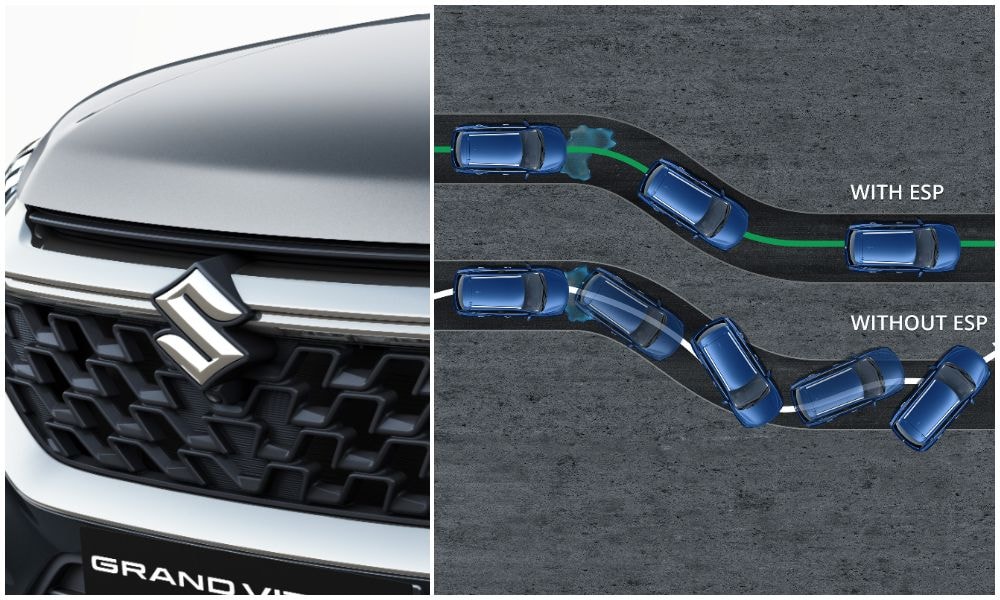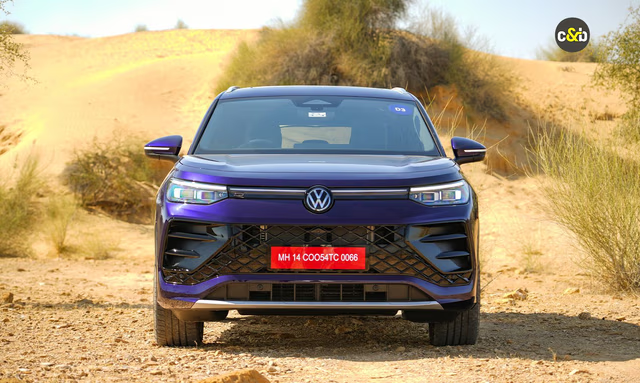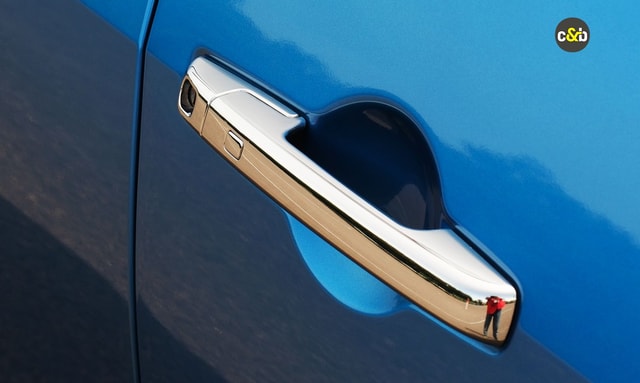Maruti Suzuki Makes ESC Standard On Most Models In Light Of Bharat NCAP Rollout

- Nearly all Maruti Suzuki cars – from both Arena and Nexa chains – now have ESC as standard.
- Only Maruti vehicles that miss out on ESC are the Alto K10, S-Presso MT and Eeco.
- From 2024, Bharat NCAP crash test requirements necessitate ESC for three-star and above ratings.
India’s leading carmaker Maruti Suzuki has announced the introduction of a key safety feature, electronic stability control (ESC), as standard across most models in its line-up. Every variant of nearly every car and SUV Maruti Suzuki sells – from the Celerio all the way up to the Grand Vitara – is now equipped with ESC. The only models that miss out on the addition of this feature are the entry-level Alto K10, the Eeco van and the manual transmission variants of the S-Presso; automated manual transmission (AMT) variants of the S-Presso will get ESC. Additionally, automatic and AMT versions of all Maruti cars and SUVs now also have hill hold assist as standard.
Also Read: Maruti Suzuki Fronx Launched At Rs 7.46 Lakh; Available With Two Engine Options
This boost to the safety kit of Maruti Suzuki’s passenger vehicle line-up is part of the updates made by the manufacturer as part of its transition to having a BS6 Phase-II Real Driving Emissions (RDE) compliant range. The update has also introduced an enhanced onboard diagnostics (OBD) system that monitors emissions in real-time and can notify drivers in case it detects malfunction. Maruti Suzuki increased prices of its offerings by 0.8 percent at the start of April – its second price hike in 2023 – which factors in the additional cost introduced by the inclusion of the new OBD system as well as ESC, so no further changes in price are expected with the addition of these new features.
Also Read: Maruti Suzuki Issues Recall of 7213 Units Of The Baleno RS
What’s also interesting is the timing of this announcement – India’s own crash testing programme for passenger vehicles, dubbed Bharat NCAP (BNCAP), went official on April 1, 2023 after road transport minister Nitin Gadkari approved the draft notification for the testing protocol in 2022. As per the requirements of Bharat NCAP, from 2024 onwards, to be eligible for a test rating of three stars or higher, a car must have ESC as standard, as vehicles with ESC only being available as an option cannot receive a test rating higher than two stars under the BNCAP protocol.
Cars on sale in India will soon be accorded safety ratings under the Bharat NCAP test protocol.
In the past, Maruti Suzuki has faced criticism for the poor performances of its vehicles in crash tests conducted by safety watchdog Global NCAP. With the exception of the original, made-in-India Vitara Brezza – which secured four stars – no Maruti car or SUV has secured a rating higher than three stars in Global NCAP’s tests, with the most recently-tested models – the Alto K10 and WagonR – receiving dismal ratings of two stars and one star, respectively. Up until recently, most vehicle manufacturers operating in the country did not build cars to specifically conform to Global NCAP requirements, but with the introduction of Bharat NCAP, it is more than likely other brands will follow suit and make ESC standard on all their models on sale in the time to come.
Latest News
 Seshan Vijayraghvan | Feb 4, 2026Skoda Kylaq Crosses 50,000 Units Sales MilestoneThe Kylaq has been the brand’s best-selling car, which has led to Skoda Auto India’s best-ever sales performance in 2025.1 min read
Seshan Vijayraghvan | Feb 4, 2026Skoda Kylaq Crosses 50,000 Units Sales MilestoneThe Kylaq has been the brand’s best-selling car, which has led to Skoda Auto India’s best-ever sales performance in 2025.1 min read Seshan Vijayraghvan | Feb 4, 2026Volkswagen Tayron R-Line’s Pre-Bookings Open For Rs. 51,000Customers can pre-book the SUV for a token of Rs. 51,000; however, the price announcement will take place sometime later in February 2026.1 min read
Seshan Vijayraghvan | Feb 4, 2026Volkswagen Tayron R-Line’s Pre-Bookings Open For Rs. 51,000Customers can pre-book the SUV for a token of Rs. 51,000; however, the price announcement will take place sometime later in February 2026.1 min read car&bike Team | Feb 4, 2026Audi India Adds ‘My Auras’ In-Car Experience ModesAvailable for select models, the feature syncs the mood lighting, music, air conditioning, seat heating/ventilation and massage functions based on the selected mode.1 min read
car&bike Team | Feb 4, 2026Audi India Adds ‘My Auras’ In-Car Experience ModesAvailable for select models, the feature syncs the mood lighting, music, air conditioning, seat heating/ventilation and massage functions based on the selected mode.1 min read car&bike Team | Feb 4, 2026Suzuki Access ABS Launched At Rs. 92,328The Suzuki Access ABS is now the most-affordable two-wheeler with single-channel ABS on sale in India.2 mins read
car&bike Team | Feb 4, 2026Suzuki Access ABS Launched At Rs. 92,328The Suzuki Access ABS is now the most-affordable two-wheeler with single-channel ABS on sale in India.2 mins read car&bike Team | Feb 4, 2026Nissan Gravite MPV India Debut On February 17Set to be underpinned by Renault-Nissan’s CMF-A platform, the Gravite will share its underpinnings with the Renault Triber.1 min read
car&bike Team | Feb 4, 2026Nissan Gravite MPV India Debut On February 17Set to be underpinned by Renault-Nissan’s CMF-A platform, the Gravite will share its underpinnings with the Renault Triber.1 min read car&bike Team | Feb 3, 2026China Mandates Fitting of Mechanical Door Handles On New Cars From 2027Vehicles already on sale to be given an additional 2 years to conform to the new norms.2 mins read
car&bike Team | Feb 3, 2026China Mandates Fitting of Mechanical Door Handles On New Cars From 2027Vehicles already on sale to be given an additional 2 years to conform to the new norms.2 mins read
 Bilal Firfiray | Feb 4, 2026Volkswagen Tayron R-Line Review: Sensible Flagship For IndiaVolkswagen has introduced a made-in-India flagship SUV that offers space, comfort, performance, and German driving finesse in a practical three-row package. But is the Tayron R-Line good enough?6 mins read
Bilal Firfiray | Feb 4, 2026Volkswagen Tayron R-Line Review: Sensible Flagship For IndiaVolkswagen has introduced a made-in-India flagship SUV that offers space, comfort, performance, and German driving finesse in a practical three-row package. But is the Tayron R-Line good enough?6 mins read Preetam Bora | Feb 2, 2026TVS NTorq 150 Road Test Review: Bigger, Better & More Efficient!We test the new TVS NTorq 150 out in the real world to get a sense of what it offers in terms of performance, dynamics and fuel economy.7 mins read
Preetam Bora | Feb 2, 2026TVS NTorq 150 Road Test Review: Bigger, Better & More Efficient!We test the new TVS NTorq 150 out in the real world to get a sense of what it offers in terms of performance, dynamics and fuel economy.7 mins read Bilal Firfiray | Jan 21, 2026Tata Punch Facelift Review: New Turbo Engine; Same Old SoulWith the update, the Tata Punch facelift retains its character of being a healthy runabout, which is perfect for Indian roads. But have these changes made it any better?7 mins read
Bilal Firfiray | Jan 21, 2026Tata Punch Facelift Review: New Turbo Engine; Same Old SoulWith the update, the Tata Punch facelift retains its character of being a healthy runabout, which is perfect for Indian roads. But have these changes made it any better?7 mins read Amaan Ahmed | Jan 17, 2026Bajaj Chetak C25 First Ride Review: Basic, Likeable E-Scooter For First-Time RidersThe Chetak C25, in quite a few ways, is poles apart from the larger and more powerful 30 and 35 Series models, but in its mannerisms, it is very much a Chetak.8 mins read
Amaan Ahmed | Jan 17, 2026Bajaj Chetak C25 First Ride Review: Basic, Likeable E-Scooter For First-Time RidersThe Chetak C25, in quite a few ways, is poles apart from the larger and more powerful 30 and 35 Series models, but in its mannerisms, it is very much a Chetak.8 mins read Bilal Firfiray | Jan 9, 2026Toyota Urban Cruiser Hyryder: 10,000 km Long-Term ReviewAfter spending over three months and 10,000 km with the Toyota Urban Cruiser Hyryder Hybrid, we were impressed by its real-world mileage, seamless hybrid, practical comfort, and Toyota reliability. Is it the best C-SUV then?5 mins read
Bilal Firfiray | Jan 9, 2026Toyota Urban Cruiser Hyryder: 10,000 km Long-Term ReviewAfter spending over three months and 10,000 km with the Toyota Urban Cruiser Hyryder Hybrid, we were impressed by its real-world mileage, seamless hybrid, practical comfort, and Toyota reliability. Is it the best C-SUV then?5 mins read



























































































































